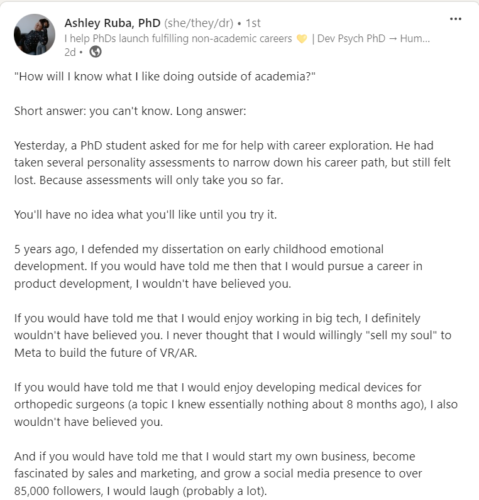Note: This post was originally posted on Medium, but updated for the After Your Blog.
Why It Can Be Hard to Leave Academia
When I first began searching for careers outside of academia, I felt lost and hopeless.
The process of leaving academia was filled with questions on top of more questions. What will I do next? Can I do “good” research? Will people hire an academic? Will other people accept me? What profitable skills did I really have?
I looked to career services and other academics in academic institutions. However, career services were mainly geared towards undergraduates from my personal experience. Academics and fellow graduate students working at academic institutions are generally focused on preparing students and themselves for the academic job market.
Academic institutions are not doing enough to answer the main two questions of academics leaving academia: “What do I do next in my career?” How will I do it?” PhDs who have made successful transitions into the industry (or have been successful in the process so far) should pass the metaphorical torch to lost academics who need guidance.
The common analogy of academia is “the ivory” tower. The meaning of the ivory tower refers to “a state of privileged seclusion or separation from the facts and practicalities of the real world.” For academics in industry to truly pass the torch to other academics, they need to throw aside all notions of seclusion or separation. In many cases, this is why academics are leaving.
As people who already made the transition, PhDs in industry can pass their knowledge and information as a way to provide guidance to those who need it to make sense of their next steps. Social media has made it much easier to share information about personal experiences on places like LinkedIn and Twitter/X.
From my experience, the best ways that PhDs have helped me in the process were a combination of the following listed below.
Engage in Public Outreach (Social Media)
Engaging in public outreach refers to posting about your experiences occasionally on places like Twitter or LinkedIn. Many of the resources I found in my post-career path were through academics talking about their experiences on Twitter (#alt-ac, for example).
Sharing your experiences on social media can inform others about potential career paths, hurdles to consider, skills to learn or upskill, or general emotional support seeing that others can indeed pivot. It doesn’t have to be deep either. Having posts that talk about your specific job functions and what you do in a way that isn’t laid out in a job description can do wonders.
Thousands of former academics are on places like X and LinkedIn. For example, Ashley Ruba, PhD talks quite extensively about her journey from academia on LinkedIn. Posts can range from specific skills she learned, as well as personal feelings associated to leaving academia that have inspired thousands of followers.

Set up “Coffee Hours”
To answer questions, having a casual space/time to answer questions can make a difference. Even if it is only a few hours a week or a month, setting aside a few hours of your day can help others make sense of their careers.
As someone who has likely benefited from guidance and support in your own career journey, offering to help someone else navigate theirs can be immensely rewarding. By sharing your experiences, offering advice, and providing encouragement, you have the opportunity to positively impact someone else’s career development and contribute to their success.
Be Blunt about Academia
When people reach out to you, they don’t want you to sugarcoat your experiences. Academia works for some folks, and for others, it was a stressful experience. They want to know how and why you left.
Don’t be afraid to explain the downsides of academic life, especially as a faculty member or an adjunct member.
Be Blunt About Non-Academic Careers
No job is perfect. Trying to idealize non-academic jobs will only leave academics feeling even more disillusioned. It’s okay to talk about the drawbacks of industry careers.
It’s better to be informed than to be ignorant.
Life is a series of trade-offs and people need to know what trade-offs make the most sense in their own lives.
Problems of Privilege
If I’m being honest with myself, being a white able-bodied man has afforded me privileges in my search for non-academic roles. Discrimination exists in hiring processes whether recruiters or hiring managers would like to admit it.
Additionally, PhDs outside the US also face a unique set of difficult challenges in terms of visas and immigration paperwork.
The act of leaving academia is not easy for everyone and former academics working in industry should be aware of this aspect in their discussions with students and academics.
Concluding Thoughts
My own experience of pursuing non-academic careers would not have been possible without the help of former academics who work in the industry. They gave me their time and honest thoughts about leaving academia and the specifics of non-academic careers that academic institutions failed to provide.
One of the best quotes I like to share with folks is from Leaving Academia, a big inspiration for my first steps in my pivot. The quote is here below:
“Whenever you can, advocate for other academics who end up traveling paths they didn’t want or expect to walk. If someone asks you for an informational interview, make the time to do it. If they’re looking for new contacts, connect them to people you know and coach them on how to build a network.” Leaving Academia: A Practical Guide.

Ryan Collins PhD is an SEO Strategist at Go Fish Digital. Ryan completed his PhD in Media Arts and Sciences at Indiana University Bloomington in 2021. During his time at Indiana University, Ryan eventually pivoted into a career in SEO and Digital Marketing after having informational interviews with working professionals in SEO, working on side projects, and gaining industry experience.
